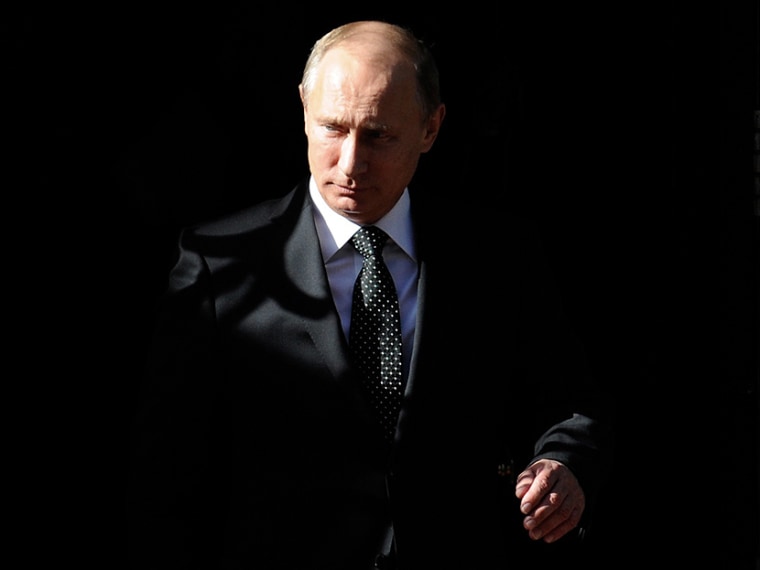It seems like an eternity ago when a beaming Secretary of State Hillary Clinton presented her Russian counterpart a yellow box that contained a red “reset” button in March 2009. It was meant to symbolize America’s hopes to mend its fractured relationship with Moscow. The U.S. and Russia's relationship had deteriorated under President George W. Bush over a host of issues—even after Bush famously assured Americans and declared after a 2001 meeting with President Vladimir Putin: “I looked the man in the eye. I was able to get a sense of his soul.”Clinton's gesture of goodwill in Geneva was meant to put tensions over NATO expansion, missile defense, and Russia's 2008 invasion of Georgia. Fast forward to today and relations have gradually devolved into another cold era, with President Obama canceling a planned summit with Putin in Moscow. In part, the decision was a response to Putin's refusal to extradite National Security Agency leaker Edward Snowden back to the U.S., and granting him temporary asylum.
Related: Putin meeting off after Russia spurns US over Snowden
For a time, things did look good for U.S.-Russia relations under Obama. The commander-in-chief was able to push through a nuclear arms reduction treaty in his first term. He and President Dmitri A. Medvedev met for the first time, promising a “fresh start” in the U.S. and Russia relationship,But the two world powers have also been trading blows over Syria, with the U.S. charging Putin with perpetuating the bloody civil war there. They’ve clashed over Russian authorities’ crackdown on anti-Kremlin groups and NGOs. Earlier this year, Russia claimed to have caught a CIA spy, once again heightening tensions. And then there was the unforgettable, made-for-Hollywood tale of a Russian spy ring in the U.S. starring Anna Chapman, who became a celebrity in Russia after her deportation and recently proposed marriage to Snowden via Twitter.All of this seems to have pushed the U.S. and Russia from friends to frenemies. Obama told Jay Leno on Tuesday that at times Moscow will sometimes “slip back into Cold War thinking and a Cold War mentality.” He hedged, however, and noted that the two countries cooperated on Afghanistan and counter-terror efforts following the Boston Marathon bombings.Obama also dinged Russia for its treatment of gays and lesbians. (Putin signed a law in June that bans the "propaganda of nontraditional sexual relations," essentially making homosexuality illegal.) “I have no patience for countries that try to treat gays or lesbians or transgender persons in ways that intimidate them or are harmful to them," Obama said to Leno.Things are undeniably chilly between the two countries. But is Snowden the catalyst for the freezing U.S.-Russian relations, or just the proverbial last straw?Steven Pifer, a senior fellow at the Brookings Institution who specializes in Russia and arms control, said Snowden was surely a factor in Obama canceling the meeting with Putin, but the incident was “relatively minor." Instead, U.S.-Russia relations have deteriorated gradually, he said.“If there were prospect of progress on missile defense or further nuclear reductions, [Obama] would have gone,” said Pifer. “He avoids criticism [over Snowden] by not going.”Obama received support from both Democrats and Republicans for canceling the meeting. Democratic Sen. Charles Schumer of New York said Putin was “acting like a school yard bully and doesn’t deserve the respect of a bilateral summit.” GOP Sen. John McCain of Arizona also agreed with Obama, but suggested going even farther in distancing America from Russia.A spokesman for John Boehner even seemed gleeful over the snub, saying “The president’s signature foreign policy accomplishment from the first term—a reset with Russia—has just collapsed.”The Kremlin, meanwhile, said it was “disappointed” with Obama’s decision and interpreted Obama’s cancellation as being solely related to Snowden. Yuri Ushakov, Putin’s foreign policy adviser, said "It is clear that the decision is linked to the situation over the employee of the American special services Snowden, which was absolutely not created by us.”F. Joseph Dresen, a program associate at Woodrow Wilson Center’s Kennan Institute, said the U.S. is in a “tough spot right now,” although not as tough as what President George W. Bush faced during the war with Georgia. Dresen noted that Secretary of State John Kerry and Defense Secretary Chuck Hagel plan to meet in Washington with their Russian counterparts on Friday. And Obama still has plans to attend the G-20 summit in St. Petersburg in September.“It shows he favors engagement…but I don’t think we can look forward to any positive breakthroughs in the near to medium term,” said Dresen, predicting the relationship would continue in a “business-like manner” over shared interests including Afghanistan, commercial relations, and security.
